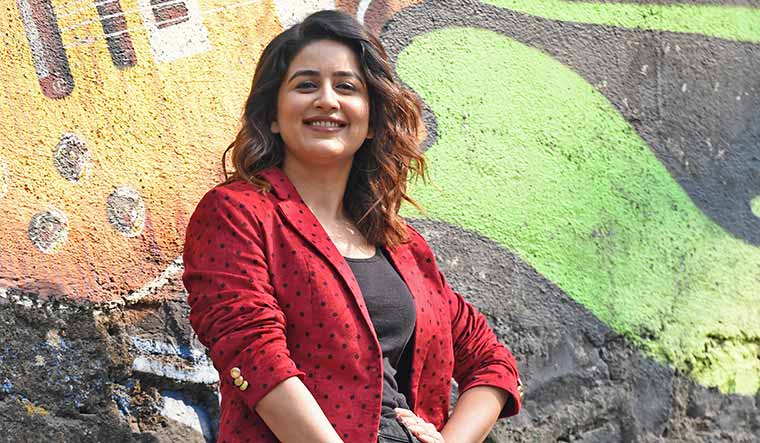On 2018, when director Rohit Shetty was casting for Simmba, the third instalment of his cop universe, headlined by the effervescent Ranveer Singh, Shetty was looking for a fresh face to play Singh’s sister. The brief was to find someone who was innocent, yet assertive; versatile, yet restrained. Someone who will hold her own in the character of Aakruti Dave, the rape victim. Shetty recalled the face of a young actor in Laadli, a delightful music video, composed and conceptualised by A.R. Rahman, and sung by Lata Mangeshkar. An ode to the girl child, Laadli became a cult hit and continues to be one of the most widely watched videos on women empowerment. Vaidehi Parashurami, an attractive actress in her 30s, from Marathi cinema, became the face of that video.
But when Simmba’s casting agency called Parashurami, she dismissed it as a prank. Shetty persisted, and a month later Parashurami signed her first Bollywood film, which went on to rake in close to Rs400 crore worldwide.
Born in a middle-class family in Mumbai with no background in films, Parashurami, a student of English literature and law, is a classical dancer par excellence. At seven she began training in Kathak, gave her first public performance at 12, pursued a post graduation in the dance form, and began teaching Kathak under her guru, Asha Joglekar. Incidentally, it was dance that gave her a headstart in films―she bagged her debut film, Ved Lavi Jeeva, in 2010, at the age of 17. In the Marathi film, directed by Mahesh Kothare, Parashurami essayed the role of a college student from a wealthy family who stands up to her parents in defence of her love, a mechanic.
In the role of Julie Chitale in the recently released Jaggu Ani Juliet, Parashurami is a treat to watch. She is every bit believable as the charming Chitale who is rebellious, headstrong and independent. Parashurami in real life is diametrically opposite to Chitale. Yet, Parashurami gives herself over to Chitale so completely. Diversity in projects is key to sustaining momentum and enjoying the journey, says Parashurami, to THE WEEK.
“As an actor I am trying different genres and trying to work with good directors. I am convinced that I am here to be an artist who can look ravishing and prolific at the same time,” she says. When I met Parashurami she looked sparkling in a neon pink blazer, which complemented her carbon black denims. Her pleasant demeanour and a cool vibe give off a girl-next-door feel that is impossible to miss.
Films to Parashurami are akin to a ladder; each one being a stepping stone to the next. Every time the director claps action, she convinces herself that she is somebody else and is living that character’s experience so that the role can ring true to her. This is how she prepared for Chitale, too. “I am nothing like her, and that is why it was a challenge. Unlike her, I would never go backpacking. I am extremely scared of doing anything entirely alone, and unlike her I come from a very different background and have had an extremely guarded upbringing. So, for me, to understand Chitale was difficult. But, in the process, Chitale and Vaidehi started exchanging notes and I got a lot of confidence.”
Even if the artist remains in a state of constant conversation with his or her character until a film is done and dusted, the chemistry, in some cases, fails to make it to the final cut, and, thereby, leads to major disappointment, as it did for Parashurami in Wazir (2016). Although the Bejoy Nambiar directed dark detective thriller performed fairly well at the box office, it failed to take off for Parashurami. “For me, it largely went unnoticed because very few of the scenes I had shot for actually went up on the screen,” she says with a sigh. But then after a brief pause, she says, “But I did get to rub shoulders with Amitabh Bachchan, and, that, in itself, was mission accomplished.”
Over the course of nearly a decade, Parashurami has successfully worked with a diverse group of directors, and has essayed scripts that have failed to box her, so far. “My motto is to ensure that every successive film is different from the preceding one.”
At the moment, she is awaiting her next big project on OTT―Shetty’s Indian Police Force.
Parashurami’s Bollywood dreams are well thought out. “The target is to take inspiration from someone like Tabu. One who’s versatile, talented and sensual, one who can have it all, and, yet, remain unaffected. That’s the kind of journey that appeals to me,” she says with a glint in her eye. In person just as in front of the camera, Parashurami exudes charm and a touch of vulnerability. She also conveys striking self-assurance. When she arrived for my interview, Parashurami wasn’t accompanied by multiple assistants; she loves to talk, and to laugh her heart out. “I am just an actor, not an otherworldly creature,” she says.


